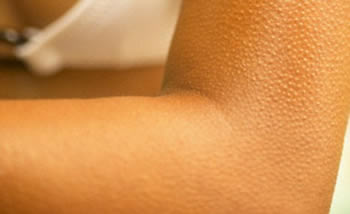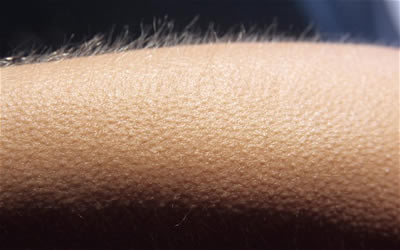Difference between Goose Bumps and Goose Pimples
Key Difference: Goose bumps and goose pimples both refer to the natural phenomenon where the hairs on the body stand up, which results in the roots of the hairs looking like bumps all over the body. Goose bumps and goose pimples are also known as goose flesh. The medical term for the phenomenon is cutis anserine.
 While, goose bumps and goose pimples might sound like two different phenomenons, the reality is that they are the same. Both terms refer to natural phenomenon where the hairs on the body stand up, which results in the roots of the hairs looking like bumps all over the body. They are especially visible on the arms. Goose bumps and goose pimples are also known as goose flesh. The medical term for the phenomenon is cutis anserine.
While, goose bumps and goose pimples might sound like two different phenomenons, the reality is that they are the same. Both terms refer to natural phenomenon where the hairs on the body stand up, which results in the roots of the hairs looking like bumps all over the body. They are especially visible on the arms. Goose bumps and goose pimples are also known as goose flesh. The medical term for the phenomenon is cutis anserine.
The phenomenon is called goose bumps, goose pimples, or goose flesh because the bumps look similar to the skin of the goose, or rather any poultry when their feathers have been pulled out. The bumps were actually the open pores or roots of the features. However, people back in the day actually though that is what the goose’s flesh looked like, as they did not yet know the concept of skin pores and roots.
It is believed that the phenomenon of goose bumps is a vestigial reflex inherited by us from our ancestors. In fact, it is a trait that we share with a lot of the other mammals. When a porcupine is threatened it raises its quills in an attempt to ward off the predator. Similarly, the fur of cats and dogs tends to stand up when they are frightened. This makes them appear bigger and more threatening, hence making the predator reconsider attacking. Therefore, it was a defense mechanism that helps early humans to survive in the wild.
However, today, goose bumps might occur even when one does not feel threatened; in fact they commonly occur in situations where no threat is involved. One of the common reasons behind goose bumps is the cold. When, a person is feeling cold, the body sets in motion the process for goose bumps. The raised hairs then provide an additional level of insulation for the person. In addition, goose bumps may also occur when the person experiences strong emotions such as fear, nostalgia, pleasure, euphoria, awe, admiration, and sexual arousal.
 The reflex of producing goose bumps is known as arasing, piloerection, or the pilomotor reflex. When a person is feeling threatened or experiences strong emotions, the brain sends a signal to the sympathetic nervous system, which is responsible for many fight-or-flight responses. The sympathetic nervous system in turn activates the pilomotor reflex, which causes the arrector pili muscles to contract and pull the hairs up. The arrector pili muscles are the tiny muscles at the base of each hair on the body.
The reflex of producing goose bumps is known as arasing, piloerection, or the pilomotor reflex. When a person is feeling threatened or experiences strong emotions, the brain sends a signal to the sympathetic nervous system, which is responsible for many fight-or-flight responses. The sympathetic nervous system in turn activates the pilomotor reflex, which causes the arrector pili muscles to contract and pull the hairs up. The arrector pili muscles are the tiny muscles at the base of each hair on the body.
While the goose bumps are most visible on the forearms, they do also occur on the back of the neck, on the legs, and practically on any area of skin that has hair. In some people, they may even occur on the face or on the head. Goose bumps are also a classic symptom of some diseases, such as temporal lobe epilepsy, some brain tumors, and autonomic hyperreflexia. Goose bumps can also be caused by withdrawal from opiates such as heroin. Also, keratosis pilaris is a type of skin condition that mimics the appearance of goose bumps.
Comparison between Goose Bumps and Goose Pimples:
|
|
Goose Bumps |
Goose Pimples |
|
Definition (Merriam-Webster) |
Small bumps on your skin that are caused by cold, fear, or a sudden feeling of excitement |
|
|
Description |
Goose Bumps and Goose Pimples are the bumps on a person's skin at the base of body hairs which may involuntarily develop when a person is cold or experiences strong emotions. |
|
|
Causes |
When a person is cold or experiences strong emotions such as fear, anger, nostalgia, pleasure, euphoria, awe, admiration, and sexual arousal. It can also be a reaction to hearing nails scratch on a chalkboard, listening to awe-inspiring music, or feeling or remembering strong and positive emotions, e.g., after winning a sports event, or while watching a horror film. |
|
|
Treatment |
You do not actually require a treatment of any source. If the goose bumps are because you are cold, then get warmer: put on a jacket, rub your arms to generate heat, etc. If it is due to any other reason, then they will go away on their own after a few minutes. |
|
Image Courtesy: dailymail.co.uk, telegraph.co.uk









Add new comment